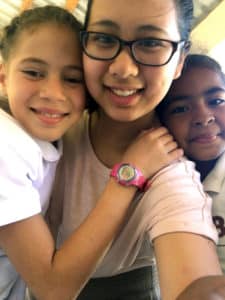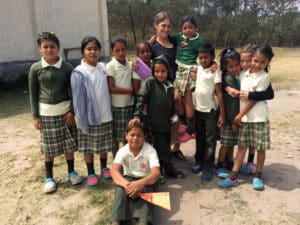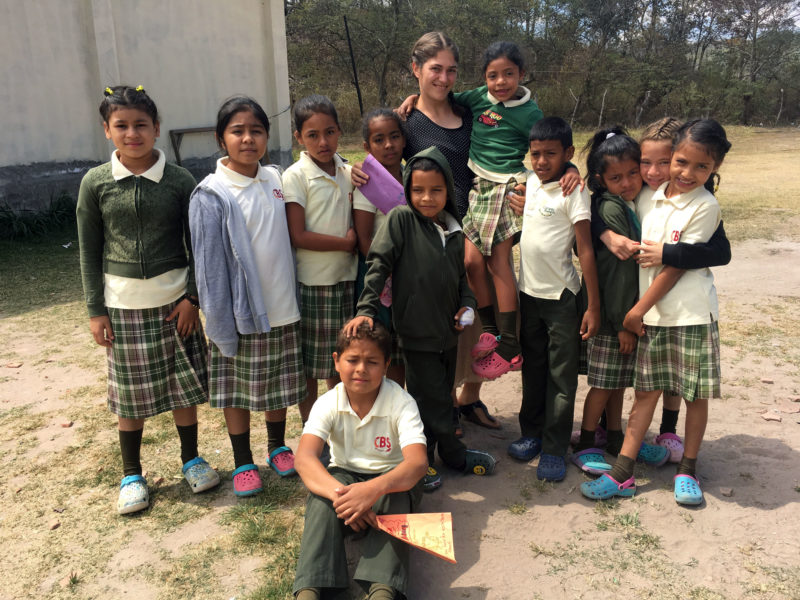
Everything is happening too much, too fast. Yet in this environment I seem to thrive.
AnnElise Kuninobu, a 2016 Weimar Academy graduate, was a sophomore in college when she decided to volunteer as a teacher for a year. The beginning of 2018 found her at VIDA Internacional Elementary School in the southern-central highlands of Honduras. She writes honestly in this excerpt, expressing what her experience has taught her about first impressions, herself, and most importantly, about God.
***
There are millions of little moments that make up the 24 hours of a day, and billions more that make up a week. This is my attempt to capture the fleeting moments that make up the past 3 1/2 months that I have been at Campos Blancos School in the beautiful country of Honduras.
14.01.18
I’ve never felt so alone. Flying by oneself to a foreign country to spend a year as a student missionary may seem to be of little significance in comparison to other more thrilling ventures, yet my heart shuddered in anticipation of the unknown. As I found my assigned seat on the first flight on that chilly January night, I felt unsure and nervous. “Did I make the right decision? Why am I here?” These thoughts plagued me from that moment and lingered on with accompanying loneliness for what would become several weeks into the year.
15.01.18
I remember my first thoughts as I stepped out of the airplane that had just landed in Tegucigalpa, Honduras: “This looks like California.” The mountainous terrain, the wind in my face, the ruggedly dry climate, and the busyness of city life reminded me of a Latino version of the city of Sacramento. I soon discovered that my first impressions were correct: this mountainous part of Honduras is a close comparison to the climate and landscape of California, thereby making for an easy transition to the new environment. A 1 1/2 hour drive from the capital, we arrived at VIDA Internacional, the ministry to which I dedicated this year, 2018, to living and working and growing. “Here begins the adventure . . .”

31.01.18
More than two weeks of constant work and still, I feel as if I have too many responsibilities to handle. Planning, organizing, decorating, thinking, exploring, and creating, and yet they say that these two weeks are the easiest of the year. I’m sure that once I start teaching, my life will be even crazier than I could imagine. In this type of mission school, there is always work to be done. I have my first parents’ meeting with the families of my fourth grade, then on Monday, we begin our first day of school. Everything is happening too much, too fast, yet in this environment I seem to thrive. I love the thrill of completing a task, checking it off my to-do list, then starting another project or assignment.
05.02.18
The first day of school involved a presentation with the faculty of the school and some games and challenge courses. These kids at Campos Blancos School are over-the-top friendly. As soon as they found out that I was their teacher, they swarmed me with hugs and questions. Although my nerves were visibly evident as the fourth grade students gathered in our classroom and stared at my with expecting, yet inquisitive eyes, it was soon evident that I had little for which to be afraid. As I learned their names, favorite colors, and other things about them, I discovered a playful and curious group of 8-9 year old’s with a passion for learning and creativity. What a perfect group of little angels . . .

16.03.18
Good impressions do not last forever, I realized after a month of teaching. The curious, twinkling eyes turned to mischievous glints, and the once innocent, sweet-looking faces turned into upside down smiles with complaining groans continuously escaping their lips. They think that being in school is a game . . . Finding creative ways to turn math and English into a game so that they would actually pay attention in class turned out to be a harder challenge than I first perceived, while at the same time, attempting to improve my classroom management skills. With the mindset of completely selfless service, I also began to take on extra responsibilities, such as event planning, visiting students and their families, being on committees, giving private guitar and keyboard lessons, tutoring younger failing students, and committing to everything that was asked of me [was] so that I could help the school in any way that I could. Life was stressful, but it was good.
14.4.18

I figured it out. I finally know why I am here. I thought that the cure for my loneliness of being “alone” in a foreign country was to make close, bonding friendships, or to devote my time and energy into my responsibilities. But, while those are important and necessary priorities, it is not actually the reason why I am working at this ministry and mission school. It is to serve others for Christ’s sake, and to let go of any selfish motivation or mindset that may prevent me from doing so. Although it may seem like a cliché, I have found it to be beyond true these past few months. God is the first One who matters, then secondly, my students, my friends, my co- workers, and the people around me. Death to self becomes a mandate; without it, the control of my life is given not to myself, but the deeper, darker power of sin that will take over my life if I let it. What a simple, yet intricately complex concept to wrap my mind around. In situations in my students’ lives in which I have no control, such as accidents, broken bones, and family or home troubles, who will I let control my reactions, my words, my life? “Jesus, take my heart, for it is Yours now and forever.”
“Él que comenzó la buena obra en ti, la perfeccionará hasta el día de Jesucristo.”
***
Ann Elise will return to her studies at Weimar College at the beginning of 2019.

